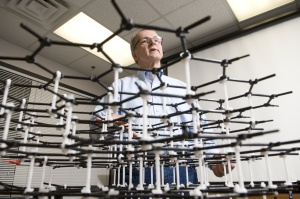Aug 1 2008
A Michigan State University researcher and his students have developed a nanomaterial that makes plastic stiffer, lighter and stronger and could result in more fuel-efficient airplanes and cars as well as more durable medical and sports equipment.
 Drzal peers through a model of a carbon molecule. Photo by G.L. Kohuth.
Drzal peers through a model of a carbon molecule. Photo by G.L. Kohuth.
The material – xGnP Exfoliated Graphite NanoPlatelets – will be instrumental in the development of new and expanded applications in the aerospace, automotive and packaging industries, said Lawrence Drzal, University Distinguished Professor of chemical engineering and materials science at MSU and director of MSU’s Composite Materials and Structure Center.
Drzal led the research group that developed the product, which is considered to be a practical, inexpensive material that has a unique set of physical, chemical and morphological attributes. The nanoscale material, which is electrically and thermally conductive, has reduced flammability and barrier properties, he said.
The graphene nanoparticles are being manufactured by a new startup company, XG Sciences Inc. (www.xgsciences.com), located in mid-Michigan and a spinoff from intellectual property owned by MSU. XG Sciences has an exclusive license to manufacture this material.
“XGnP can either be used as an additive to plastics or by itself it can make a transformational change in the performance of many advanced electronic and energy devices,” Drzal said. “It can do so because it’s a nanoparticle with a unique shape made from environmentally benign carbon, and it can be made at a very reasonable cost.”
The key to the new material’s capabilities is a fast and inexpensive process for separating layers of graphite (graphene) into stacks less than 10 nanometers in thickness but with lateral dimensions anywhere from 500 nm to tens of microns, coupled with the ability to tailor the particle surface chemistry to make it compatible with water, resin or plastic systems.
xGnP:
- Could be used to make lighter, more fuel-efficient aircraft and car parts, and stronger wind turbines, medical implants and sports equipment.
- Is a good electrical conductor attractive for lithium ion batteries and could be used to make transparent conductive coatings for solar cells and displays.
- Can make gasoline tanks lightweight and leak tight and plastic containers that keep food fresh for weeks.
Drzal and his partners (former students Hiroyuki Fukushima, Inhwan Do and XG Sciences CEO Mike Knox) are already looking ahead to more uses for the product – like recyclable, economical or lightweight units to store hydrogen for the next generation of fuel cell-powered autos.
“Now that we know how to make this material and how to modify it so that it can be utilized in plastics,” he said, “our attention is being directed to high-end applications where we can really make some substantial changes in the way electronics, fuel cells, batteries and solar cells perform as a result of using this material.
“As an engineer we do research with an eye on not only understanding the fundamentals of how things work, but also on coming up with solutions to solve important problems facing the world we live in,” Drzal said.
“This project goes beyond doing research and publishing papers. It appears to have made the transition from a laboratory curiosity to a commercial product and simultaneously has helped create a spinoff company to increase the economic viability of Michigan.”
For more information, visit http://www.xgsciences.com.